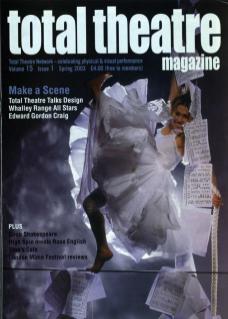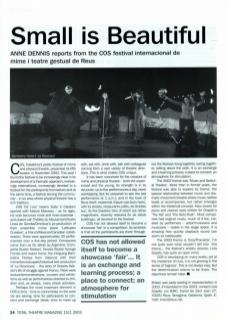COS, Catalonia's yearly festival of mime and physical theatre, presented its fifth season in November 2002. This year found the festival to be increasingly clear in its development of a thematic approach, increasingly international, increasingly devoted to a festival for the participants themselves and at the same time, a festival serving the community – in an area where physical theatre has a rich tradition.
COS '02 (‘cos' means 'body' in Catalan) opened with Marcel Marceau – as he ages, his work becomes more and more essential – and closed with Théâtre du Mouvement/Teatro Linea de Somba/Omnibus' co-production of their ensemble mime piece Latitudes Croisées, a French Mexican/Canadian collaboration. There were approximately twenty performances over a five-day period. Companies came from as far afield as Argentina (Compania Buster Keaton), Russia (Teatre Novogo Fronta) and nearer home, the intriguing Bambalina Titelles from Valencia with their mime/dance/puppet/historical text production of La Pasionaria – the story of Dolores Ibarrari's life of struggle against Franco. There were lecture-demonstrations, courses and exhibitions as well as performances directed to children and, as always, many street activities.
Perhaps the most important element in COS is time – time to concentrate on the work we are seeing, time for participants to connect and exchange ideas; time to meet up with, eat with, drink with, talk with colleagues coming from a vast variety of theatre directions. This is what makes COS unique.
It has been conceived for the creators of mime and physical theatre – both the experienced and the young. Its strength is in its structure; up to five performances a day, never overlapping (but be prepared to see the last performance at 1am); and in the town of Reus itself: modernist (Gaudi was born here), with its streets, restaurants,cafés, its October sun, its five theatres (two of which are rather magnificent, recently restored fin de siècle buildings), all devoted to the festival.
COS has not allowed itself to become a showcase 'fair' or a competition. Its ambition is that all the participants are there throughout the festival; living together, eating together, talking about the work. It is an exchange and a learning process; a place to connect; an atmosphere for stimulation.
The 2002 theme was ‘Music and Gestural Theatre'. More than in former years, the festival was able to explore its theme: the special relationship between music and dramatic movement theatre where music neither leads or accompanies, but rather emerges within the theatrical concept. New scores for piano and clarinet were written for Chaplin's The Kid and The Gold Rush. Most companies had original music, much of it live, created by performers – actor/musicians and musicians – visible in the stage space. It is amazing how quickly playback sound can seem so inadequate.
The 2003 theme is 'Eros/Thanatos'. I'm not quite sure what wouldn't fall into this theme... the festival's artistic director, Lluis Graells, has quite an open mind...
COS is developing on many levels; yet at the insistence of Lluis, it is not growing in the sense of ‘bigness'. This is not always easy. But the determination seems to be there. The objectives remain clear.
Britain was sadly lacking in representation in 2002. If interested in COS 2003, contact Lluis Graells, c/o IMAC, Carrer de Sant Joan 27, 43201 Reus, Tarragona, Catalonia, Spain. E mail: imac@reus.net

